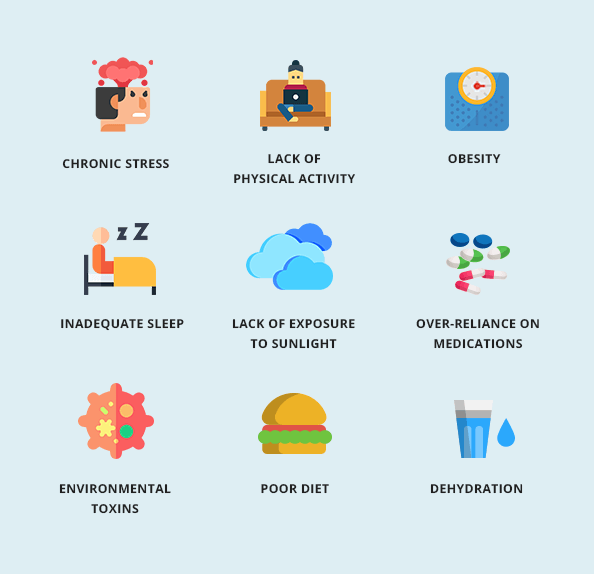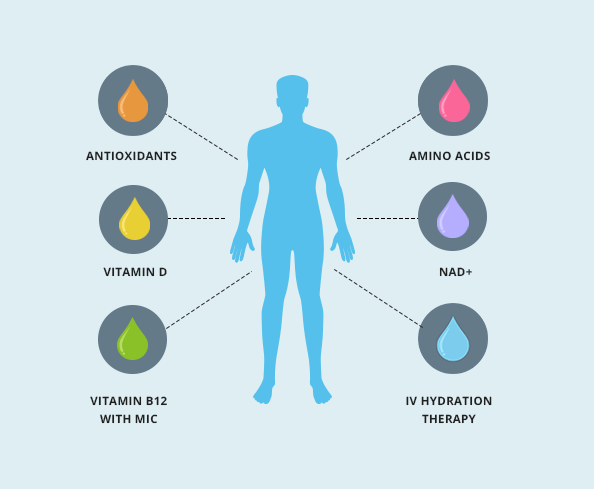
Metabolic syndrome is a cluster of simultaneously occurring metabolic issues that include high blood pressure, chronic inflammation, elevated blood sugar and high cholesterol. Despite advances in modern medicine and a broad array of drugs developed to manage the symptoms of metabolic disorders, metabolic disease is on the rise in the US and across the globe. It is estimated that as many as one in three Americans suffers from metabolic syndrome.
While many people resign themselves to a lifetime of medications that control their disease but offer no cure, others are seeking alternative ways to achieve and maintain a healthy metabolism without pharmaceuticals.
Nutritional therapy is growing in popularity as a natural alternative for lowering the parameters and risks of metabolic disorders, without the negative side effects of drugs.
Primary Causes of Metabolic Syndrome
Research points to a number of factors that play a role in metabolic disease. Most are related to unhealthy lifestyle choices and behaviors, coupled with the pressures of modern life. Lifestyle modification is the ultimate cure for metabolic syndrome.

Factors contributing to metabolic syndrome include:
- Chronic stress. Your body naturally responds to threatening situations by shifting into fight or flight mode, a hormonal response that constricts blood vessels, tenses muscles and puts your central nervous system on high alert. Under normal circumstances, once the threat has subsided, your body returns to its normal resting state. But the pressures of modern life keep many of us in fight or flight mode around the clock, elevating our blood pressure and interfering with sleep. Chronic stress is a key contributor to metabolic syndrome.
- Lack of physical activity. Modern lifestyles often require long hours of sitting, with little opportunity for exercise. Inactivity negatively affects all your body’s systems and sets you up for metabolic disease.
- Obesity. Weight gain goes hand-in-hand with stress and lack of exercise. Stress hormones set you up for weight gain, and sitting still all day keeps you from burning calories and building muscle, causing your metabolism to grind to a halt. Extra body weight increases pressure on blood vessels and encourages inflammation throughout your body.
- Inadequate sleep. Your body takes advantage of your sleeping hours to make repairs, normalize body chemistry, generate new cells and restore optimal metabolism. Disrupted and/or inadequate sleep lowers your immunity, impairs your brain function and keeps your body from feeling and looking its best.

- Lack of exposure to sunlight. All energy comes directly or indirectly from the sun, including the energy you need to function from day to day. Exposure to sunlight boosts your energy levels and helps your body synthesize Vitamin D, an essential nutrient for numerous metabolic functions.
- Over-reliance on medications. Many people rely on drugs to manage their health, instead of taking measures to modify their lifestyles and make healthier choices. But all pharmaceuticals have negative side effects, and when you combine multiple medications to manage metabolic syndrome, you are subjecting your body to a chemical soup that can do more harm than good.
- Exposure to environmental toxins. We are talking about more than air pollution here. Environmental toxins include chemicals added to drinking water, toxic substances in detergents and cleaning products, and harmful chemicals in personal grooming products, including shampoos, soaps, lotions, sunscreens, makeup and other commonly used products. Toxins are also found in fabrics, carpeting and furniture.
- Poor diet. Modern diets are full of chemical-laden processed foods that are low in nutrition, and high in sugar and calories. Most people do not eat enough quality protein or consume enough nutrient-dense fresh produce to get all the nutrients they need on a daily basis. Without adequate nutrition, your body is forced to make do with whatever you feed it, and that leads to impaired metabolic health.
- Dehydration. Your body is made up of over 60 percent water, more if you are fit and muscular. You need to stay hydrated for optimal brain function, circulation, heart health, digestive health and optimal function of your vital organs. Many people are chronically dehydrated, which contributes significantly to metabolic disease.
How IV Vitamin Therapy helps Fight Metabolic Disease

- Antioxidants. Antioxidants are nutrients that reduce oxidative stress that contributes to metabolic disease. Vitamin C and glutathione are among the most powerful antioxidants that profoundly affect human metabolism.
- Vitamin D. You need vitamin D for multiple processes throughout your body. Multiple studies have linked insufficient vitamin D levels to metabolic syndrome.
- Vitamin B12 with MIC. This powerful combination of nutrients helps your liver break down fats and use them for fuel. B12-MIC helps you manage your weight and prevent the negative effects of obesity that contribute to metabolic syndrome.
- Amino acids. Amino acids play a vital role in numerous metabolic functions, and a deficiency can seriously harm your health and contribute to metabolic syndrome.
- NAD+. Your risk of metabolic disease increases with age, in part due to declining levels of nicotinamide adenine dinucleotide (NAD+), which leads to mitochondrial and metabolic dysfunction. NAD+ is the ultimate anti-aging nutrient.
- IV Hydration therapy. Staying well-hydrated is key to looking and feeling great. Optimal hydration is fundamental to metabolic health.
IV Vitamin Therapy in NYC
Despite dozens of drugs designed to fight hypertension, diabetes, high cholesterol and inflammation, Americans are suffering from metabolic syndrome at an alarming rate. Lifestyle modification, including nutritional therapy, is key to preventing and treating metabolic disorders.
Advanced Cryo NYC offers safe and hygienic IV Vitamin Therapy in Manhattan, to combat disease and optimize your health. Contact Advanced Cryo today for more information, or to schedule your next IV Vitamin Therapy session.
Resources
Kahleova, Hana, Susan Levin, and Neal Barnard. “Cardio-metabolic benefits of plant-based diets.” Nutrients 9.8 (2017): 848.
Ojeda, Patricia, et al. “Nutritional modulation of gut microbiota—The impact on metabolic disease pathophysiology.” The Journal of nutritional biochemistry 28 (2016): 191-200.
Sultani, Ghazal, et al. “NAD+: a key metabolic regulator with great therapeutic potential.” Journal of Neuroendocrinology 29.10 (2017): e12508.